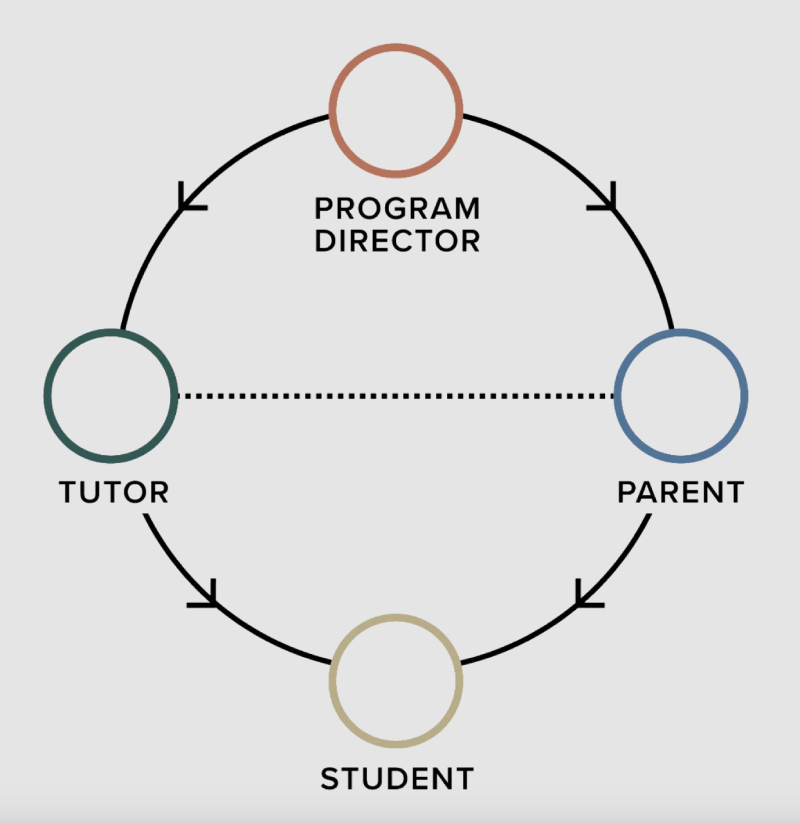What stands at the beginning of a bright future for thousands of American students? For over 30 years, our client, Summit Educational Group, has been one of the US’s most well-respected tutoring and test preparation companies, helping students prepare to pass the ACT, SAT, PSAT, SSAT, and ISEE tests.

Behind the hundreds of tutoring sessions was an ERP system to manage essential day-to-day business operations. The Intetics team created a new system allowing the client to focus on customer-oriented activities and service quality improvement and, ultimately, boost profits.

In an exclusive interview, Charles O’Hearn, President and Founder of Summit Educational Group, shared how they developed a system from scratch in just 12 months. The cooperation with Intetics was the most prominent software development project Charles’ business has ever undertaken.
Dive into the interview to explore insights from the tutoring and test preparation industry and find a number one tip for budding entrepreneurs.
Irina Dubovik: Charles, you have been an entrepreneur for many years. As the mastermind behind Summit Educational Group’s success, can you share some insights on how you started and dive into the biggest challenge you faced?
Charles: After graduating from Yale University, I founded Summit Educational Group, a company specializing in tutoring and test preparation services. The primary focus revolved around preparing students for standardized tests such as the SAT and ACT, commonly used for college admissions in the United States.
The business was owned for 34 years, and it was only sold last year. Throughout this long period, Summit Educational Group experienced steady growth. For over half of those years, the company had a licensing agreement for a back-end CRM student management system with a California-based company.
Under that agreement, the system was the backbone for managing all students, families, and business activities. However, at a certain point, the license expired, and the provider declined to renew it.
So, there was only one year available to develop our own system, which was a blessing in disguise.
At the time, it was like, “Oh my God, what are we going to do? This is how we run our business. We can’t run without it because we work with thousands of students, hundreds of tutors, and hundreds of tutoring sessions are happening daily.”
Irina: Developing a whole new system within such a short time frame must have been intense. Please share how the project was initially kicked off.
Charles: One day, a consultant referred us to somebody who ultimately guided us to Intetics. It was a solid referral. Intetics was one of the few companies that received an RFP from us.
Only a part of the functionality was developed within just a year, but certainly, more progress was made than initially anticipated. Moreover, the transition proved to be far smoother than what had been envisioned. A lot of things were just possible, thanks to Intetics. It was just amazing how quickly the team could put a system together.
A lot of things were just possible, thanks to Intetics. It was just amazing how quickly the team could put a system together.
Irina: Do you consider the system successful for your business? How has it changed internal processes?
Charles: The system was more for internal employees than for external. There was a student portal and a parent portal. But the real benefit was for us, for internal folks.
A total of 10,000 students were served each year. Imagine you have students, parents and tutors. Hundreds of tutoring sessions happen every day. Managing it all with a paper system was just impossible.
The ultimate benefit received with a new system was increased efficiency. Managing the entire process, including tutoring sessions and data tracking, proceeded smoothly and seamlessly.
Irina: Why was the developed system more efficient than the previous third-party platform you licensed? Please share some numbers to illustrate the enhancement.
Charles: The system benefited both the bottom line and the top line of the business.
The developed system contributed to increased profitability by enabling enhanced operational efficiency. Additionally, it facilitated growth by allowing a shift towards more customer and service-oriented activities within the organization.
In our finance department, Sherpa, the name of the system that Intetics created for us, streamlined operations to the extent that only a few staff members were required, thanks to its automation of numerous tasks.
There’s also a function in our business called a Program Director, responsible for managing a group of families and students. During the period when a paper-based system was in place, a Program Director could manage twenty students or twenty families. However, with the introduction of Sherpa, a Program Director could now efficiently handle 150 students.
Featured Case Study: Intetics Helps a Tutoring Company Develop an ERP System to Manage Its Day-to-Day Business Activities


The efficiency achieved with the new ERP system allowed us to charge more, which led to revenue and profit, which just kept leading to a better and better product.
Irina: To your mind, what was the most significant success of your business on the market and for you personally? What do you consider an impact on the test preparation industry?
Charles: The tool allowed us to move faster and focus more on other essential things for the service’s quality. More attention could be directed toward the student-tutor interaction, allowing for improved support for tutors.
More time became available for conducting previously neglected business activities, ultimately enhancing service quality.
The efficiency achieved with the new ERP system allowed us to charge more, which led to revenue and profit, which just kept leading to a better and better product.
If you’re asking me, the number one thing is that it increased revenue and profit.
The more specific industry impact involved providing numerous free practice tests, including SAT and ACT exams.
Free tests were just a tiny part of the functionalities that Sherpa could deliver, but they allowed us to generate high-quality score report forms in a very short time—students received their reports within 24 hours. Whereas competitors might offer practice, tests might take them two weeks to get the results of that practice test back, and a score report form was of lower quality.
Irina: That is great. You mentioned that somebody made a strong referral, considering working with Intetics. But was the main reason to start cooperation with a software development company?
Charles: Sherpa development was the biggest software development project we’ve ever undertaken. At that time, the most crucial requirement was assurance of the project’s success. It couldn’t not fail. Otherwise, our business would be ruined. At the same time, there were financial constraints to consider.
My team had some experience with smaller development firms and even individual developers. However, the requirement was for a larger company. We needed a provider that could handle all the sophisticated development challenges.
Discussions were held with a couple of US-based companies. They were more expensive, but the lack of a strong referral was the key decisive factor.
Once again, there was a budget constraint, and the project couldn’t fail. So, the biggest driver to choose Intetics was the referring consultant saying, “These guys are going to be twice as smart as anybody in the US.“
I started gaining confidence after the first meeting with Serge and Aleksey [Serge Stepantsov, Intetics COO, and Aleksey Tyutyunnyk, Delivery Director Intetics].
Our partnership with Intetics extended for a long time. Developers left, and new ones came. There was a sense of mild panic the first time it happened, but it eventually appeared to be very seamless.
It was amazing how smart and quick the developers could pick up and run the project.
We stayed with Intetics for a long time, and had I not sold the business, we still would have worked together.
I always had confidence that whatever we wanted to do, I felt like Intetics was there. They’re going to be able to get it done. I didn’t doubt that anything was possible.
Irina: What do you think is the superpower of the Intetics team, in a few words?
Charles: There was always confidence that whatever my team wanted to do, it felt like Intetics was there. They’re going to be able to get it done. No doubts that anything was possible.
Every expert working with us was very friendly and accommodating.
When the war started, it was amazing to see how the team continued to work and displayed resilience just a week or two later.
The Intetics team had the capacity to provide alternative, cost-efficient suggestions and propose innovative methods for our needs.
They were very they felt very invested in what we were doing.
Irina: What is the current state of the project, and what is its future?
Charles: The project is finished. A bigger entity bought the company in April 2022.
Irina: So, it was kind of a successful exit?
Charles: Yeah.
Irina: If we’re talking about tests and tutoring preparation or innovation in this field, how do you consider how it’s functioning now?
Charles: The test preparation field is at risk because the colleges in the United States have all adopted what they call test-optional admissions policies. As a student, you now have the option to send in a test score or not send it. If you don’t do well on the test, you can choose not to send it.
I don’t see test preparation in general right now as a shrinking industry, but general tutoring, like math, history, and English, is a growing industry.
Our industry has changed, mainly because of the pandemic. There’s much more online tutoring now, like Summit Educational Group does 80% of their tutoring, whereas we used to do everything in person at a student’s home.
And so, that’s the most significant change in the education industry, at least in the tutoring and test preparation industry, because it’s much more online, particularly since the pandemic.
Irina: What do you think about AI infiltrating every industry and how it may influence tutoring and education overall? People now can take all the needed knowledge from YouTube bloggers and influencers. What to your mind will always stay exclusive and in high demand?
Charles: All the STEM areas will keep a high demand for tutoring.
As for artificial intelligence, it’s interesting because when you apply to college in the US, you must submit an essay. Students start using AI actually to write it. It’s not advanced enough yet that people can’t pick up that AI wrote it.
But the benefit of tutoring is just being able to customize what a student needs, right?
Like, yeah, there is all on YouTube. I could build a house just by looking at things on YouTube. But it is far more effective for me to have an expert house builder come and work with me and show me, you know, that’s good.
Irina: As an expert, how do you see the future of tutoring?
Charles: Tutoring, in general, will continue to grow, and it will all go online. And in the US, it’s all about going to college and getting into the most selective college you can. As long as colleges are competitive, there will always be a demand for tutoring, particularly in the more affluent areas where parents want the best for their kids.
They’re going to pay to have tutors to help their kids learn more and do better in school because they want them to go to the best colleges.
Irina: What advice will be valuable for entrepreneurs willing to start an innovative initiative in the field of tutoring
Charles: If you’re going to start your own business and maybe have a vision of being in it for the long haul, the number one piece of advice would be to make 100% sure it’s something you feel passionate about because otherwise, you’re just going to burn out. You may even start hating it one day. So, it has to be something you feel passionate about. That is my number one recommendation. There are others, but this is the core.
